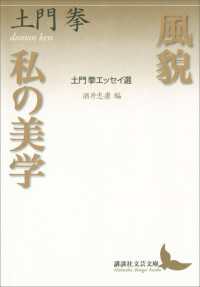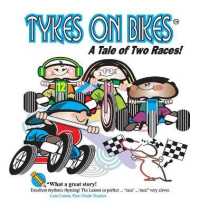- ホーム
- > 洋書
- > 英文書
- > History / World
Full Description
Runner-up, National Council on Public History Book Award, 2008
The 1930s exodus of "Okies" dispossessed by repeated droughts and failed crop prices was a relatively brief interlude in the history of migrant agricultural labor. Yet it attracted wide attention through the publication of John Steinbeck's The Grapes of Wrath (1939) and the images of Farm Security Administration photographers such as Dorothea Lange and Arthur Rothstein. Ironically, their work risked sublimating the subjects-real people and actual experience-into aesthetic artifacts, icons of suffering, deprivation, and despair. Working for the Farm Security Administration in California's migrant labor camps in 1938-39, Sanora Babb, a young journalist and short story writer, together with her sister Dorothy, a gifted amateur photographer, entered the intimacy of the dispossessed farmers' lives as insiders, evidenced in the immediacy and accuracy of their writings and photos. Born in Oklahoma and raised on a dryland farm, the Babb sisters had unparalleled access to the day-by-day harsh reality of field labor and family life.
This book presents a vivid, firsthand account of the Dust Bowl refugees, the migrant labor camps, and the growth of labor activism among Anglo and Mexican farm workers in California's agricultural valleys linked by the "Dirty Plate Trail" (Highway 99). It draws upon the detailed field notes that Sanora Babb wrote while in the camps, as well as on published articles and short stories about the migrant workers and an excerpt from her Dust Bowl novel, Whose Names Are Unknown. Like Sanora's writing, Dorothy's photos reveal an unmediated, personal encounter with the migrants, portraying the social and emotional realities of their actual living and working conditions, together with their efforts to organize and to seek temporary recreation. An authority in working-class literature and history, volume editor Douglas Wixson places the Babb sisters' work in relevant historical and social-political contexts, examining their role in reconfiguring the Dust Bowl exodus as a site of memory in the national consciousness.
Focusing on the material conditions of everyday existence among the Dust Bowl refugees, the words and images of these two perceptive young women clearly show that, contrary to stereotype, the "Okies" were a widely diverse people, including not only Steinbeck's sharecropper "Joads" but also literate, independent farmers who, in the democracy of the FSA camps, found effective ways to rebuild lives and create communities.
Contents
"Migrant Farmer," by Dorothy Babb
Preface
Acknowledgments
Introduction: The Babb Sisters
1. The Dirty Plate Trail
2. Field Notes
Oklahoma Panhandle, 1934
"Triple A, Dusted Out"
Note on the government's AAA program to reduce hog production and corn acreage
The Dispossessed
Labor Conditions
Farmer-Industrialist
Labor Protest
Organization of labor
Government Camps
Fascist characteristics of the campaign against the migratory workers in California
Visalia 2/24/38
Labor Contractor
Kinds of camps in California
Birthrate
In answer to the frequent threat...
In the fields, 1938
Large Landowners
Rag Town
Refugee Needs
A day in the camps
San Joaquin Valley, California, 1938
Thirty-seven varieties of religon...
Striking Workers, Angry Growers
March, 1938
October 29, 1938
Two stories of labor spies
Notes for a Novel
3. Reportage
Migratory Farm Workers in California (1938)
There Ain't No Food (1938)
Farmers without Farms (New Masses, 21 June 1938)
We Sure Struck It Tuff: The Storm
Dealing in Major Catastrophes (New Masses, 23 May 1939)
Letter to Dorothy Babb (May 1938)
4. Dust Bowl Tales
The Dark Earth (The Magazine, Nov.-Dec. 1934)
Morning in Imperial Valley (Kansas Magazine, 1941)
Whose Names Are Unknown
5. The Dust Bowl as Site of Memory
6. Epilogue: Letters from the Fields
Notes
Bibliography
Index
-

- 電子書籍
- テコンダー朴 分冊版26
-

- 電子書籍
- 風貌 私の美学 土門拳エッセイ選 講談…





